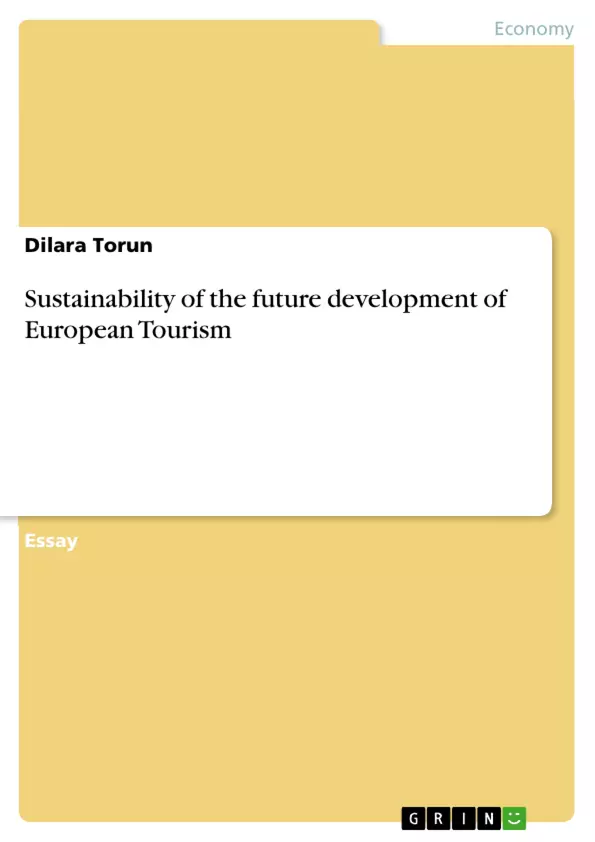This essay makes a critically review of the philosophy and the application of the term
sustainability by the European Commission to the future development of the European
Tourism. The European Commission is an institution of the European Union and it is in
charge of checking if the legislation is implemented in all the Member States of the Union.
One of the latest legislation is the Treaty of Lisbon and there is mentioned by the first time the
word Tourism. The European Commission is also in charge of the sustainable development in
all the sectors, but in this case we have to highlight the Tourism industry. It is also explained
briefly the concept of European Union and their characteristics. Finally, it will be explained
the different case studies like EU 2020, EDEN and JESSICA. In order to criticize the
application of sustainability.
Inhaltsverzeichnis (Table of Contents)
- Abstract
- 1. Introduction
- 2. European Union
- 3. Sustainability
- 4. Background of sustainable development in the EU context
- 5. Case studies
- 5.1. Calypso
- 5.2. EDEN
- 5.3. EU 2020
- 5.4. European cycle route network EuroVelo
- 5.5. Horizon 2020
- 5.6. JESSICA
- 5.7. Tourism Sustainability Group
- 6. Conclusion
- 7. References
Zielsetzung und Themenschwerpunkte (Objectives and Key Themes)
This essay critically examines the European Commission's philosophy and implementation of sustainability in relation to the future development of European tourism. It uses a range of EU-supported tourism initiatives as examples to support its analysis.
- The importance of sustainable tourism development within the European Union.
- The European Commission's role in promoting sustainable tourism practices.
- The impact of EU-supported initiatives on the sustainability of European tourism.
- The challenges and opportunities associated with implementing sustainable tourism practices.
- The economic, social, and environmental dimensions of sustainable tourism.
Zusammenfassung der Kapitel (Chapter Summaries)
- Introduction: This chapter introduces the topic of sustainable tourism in Europe and outlines the importance of the European Commission's role in promoting sustainable development within the tourism sector. It also highlights the significance of tourism as a major contributor to the European economy and its potential impact on the environment.
- European Union: This chapter provides a brief overview of the European Union, its history, and its member states. It discusses the role of the European Commission in ensuring the implementation of EU legislation, including the Treaty of Lisbon which highlights the importance of tourism within the EU.
- Sustainability: This chapter explores the concept of sustainability and its relevance to the tourism industry. It emphasizes the need for responsible resource management, cultural preservation, and the minimization of negative environmental impacts.
- Background of sustainable development in the EU context: This chapter delves into the background of sustainable development within the EU context, outlining the European Commission's efforts to promote sustainable tourism practices and the challenges faced in implementing these initiatives.
- Case Studies: This chapter presents several case studies of EU-supported tourism initiatives, showcasing how these initiatives have contributed to sustainable tourism development in Europe.
Schlüsselwörter (Keywords)
This essay focuses on the key concepts of sustainable tourism development, the European Union, the European Commission, EU-supported tourism initiatives, and case studies. It examines the role of sustainability in shaping the future of European tourism and explores the various initiatives implemented to achieve this goal.
Frequently Asked Questions
What is the main focus of this essay on European tourism?
The essay critically reviews the philosophy and application of sustainability by the European Commission regarding the future development of European tourism, specifically looking at legislation and various EU-supported initiatives.
How does the Treaty of Lisbon relate to European tourism?
The Treaty of Lisbon is significant because it is the first time the word "Tourism" is explicitly mentioned in European Union legislation, defining the Commission's role in the sector.
Which case studies are analyzed to evaluate sustainability in tourism?
The essay examines several initiatives including EU 2020, EDEN (European Destinations of Excellence), JESSICA, Calypso, and Horizon 2020 to criticize how sustainability is applied.
What are the environmental and social dimensions discussed?
The text explores the need for responsible resource management, cultural preservation, and the minimization of negative environmental impacts caused by the tourism industry.
What is the role of the European Commission in this context?
The Commission is responsible for ensuring legislation is implemented across Member States and promoting sustainable development across all sectors, including the tourism industry.
What is the importance of the Tourism Sustainability Group?
The Tourism Sustainability Group is one of the specific case studies mentioned that highlights the EU's efforts to shape the future of sustainable tourism practices.
- Arbeit zitieren
- Dilara Torun (Autor:in), 2011, Sustainability of the future development of European Tourism, München, GRIN Verlag, https://www.hausarbeiten.de/document/183445


